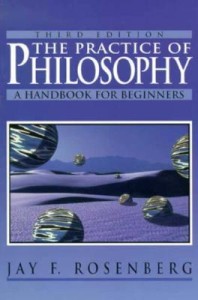Sad to say that: “One rather reaches the limits of what is teachable.”
You can teach someone how to look, but not how to see; how to search, but not how to find. Critical acumen and creative originality cannot be taught. At best they can be nourished, enhanced, and matured. And for that, just two things have been found to help: familiarity with the lay of the land and practice, practice, practice. Both take time and discipline. To gain familiarity, there is no substitutive for extensive reading; to gain practice, no substitutive for extensive writing.
“Conclusion” means what is argued for and “premises” mean what is argued from. The mere denial of premise, like the mere denial of conclusion, indicates no more than a difference of opinion…It is not enough to say that some premise is false and should be abandoned. It is necessary to show that it is.
One disputant (believer in “God exists”) lives in a universe permeated with meaning. It, and we within it, have a purpose, exist for a reason. For the other, in contrast, if there are to be meaning and purposes at all, they will need to be human meanings and purposes, for we are here not by design but as the result of the random coming together of appropriate raw materials and the systematic evolutionary working out of this original fortuitous chance concurrence. Again one philosopher sees people as “a little lower than the angels” -as creatures who are imbued with souls and with a Divine spark of life, who are granted the freedom to choose between good and evil, in accordance with or in opposition to God’s will. For the other, however, we are perhaps only “a little higher than the apes”-sophisticated deterministic organic data-processors which create whatever values there are in the process of our mutual interactions and our continuing adaptation to a universe of value-free, uncaring stuff. For one our death is our transition to a higher life; for the other, it is only the ultimate malfunction.
We have freewill-or we are determined. There are ultimate values-or all values are conventional.
Necessary versus contingent, free versus determined, mental versus material.
Sensible qualities: properties of objects accessible to the various senses: colours, shapes, sounds, flavours, odours, textures, and heat and cold.
To criticize a claim it is to produce reasons for its advocate to abandon it as false.
A claim totally disconnected from any positive consequences, however can neither cohere nor conflict with any other claims. Such a claim, then, is neither defensible nor criticisable. It is not a thesis at all. It is empty.
To find the notion of internal incoherence you have to spent considerable time exploring it to range from the relatively straightforward case of an explicit self-contradiction to subtle violations of general canons of rational practice.
Philosophical writings are not for reading through; they are for reading down into. That is why the contents of philosophy courses –unlike the contents of say, mathematics or biology courses- are not stratified by difficulty or complexity.
If reading for conclusions is reading for what a person thinks, and if reading for arguments is reading for why he or she thinks it, then reading in a dialectical setting is reading for how that person thinks- and this is the most difficult of the three tasks. Besides, you need to understand not just what and why and how a philosopher thinks. To read critically (in which the critical attitude yield more than superficial quibbles), you must also discern, what turns on the view at hand. And, of course, you will not be the first to try. So,
Pleasure and pain in studying philosophy:
A few hours before his death, Socrates offered some reflections on pain and pleasure: What a queer thing it is, my friends, this sensation which is popularly called pleasure. It is remarkable how closely it is connected with its conventional opposite, pain. They will never come to a man both at once, but if you pursue one of them and catch it, you are nearly always compelled to have the other as well; they are like two bodies attached to the same head. I am sure that if Aesop had thought of it he would have made up a fable about them, something like this: God wanted to stop their continual quarrelling, and when he found that it was impossible, he fastened their heads together; so whenever one of them appears, the other is sure to follow after. That is exactly what seems to be happening to me. I had a pain to my leg from the fetter, and now I feel the pleasure coming that follows it.
Sadly, beginning students in philosophy live more with philosophy’s agony than with its ecstasy. And this is unavoidable. But it is worth staying with it. For, unlike release from the bondage of fetters, breaking through the encrustations of frustrated thought to a clear and coherent philosophical overview of some complex conceptual terrain is a distinctively human pleasure, available only to us animals whose life is a life of speech and reason. One cannot experience it without being changed….and to grasp that truth is to make a part of you the conviction by which Socrates lived and for which he died: that the unexamined life is not worth living.
